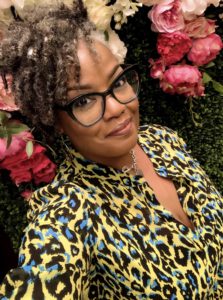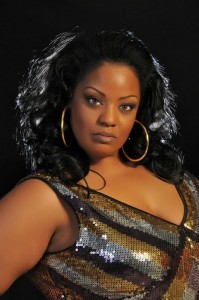 Our October 2020 Shero of the Month is Michelle Anderson of Waxahachie, Texas. Michelle is the only woman openly living with HIV to obtain a national beauty title, Ms. Plus America, in 2011. She is currently the state organizer at The Afiya Center, the only reproductive justice organization in North Texas, founded and directed by Black women. By approaching HIV/AIDS prevention from a reproductive justice framework, the Afiya Center effectively and realistically strives to decrease new transmissions among women of color. Kelly Flannery, PWN Civic Engagement Coordinator, said, “Michelle is a force! I’ll never forget when we talked before she became a PWN Policy Fellow. We discussed the organizing work she has been doing with The Afiya Center and her passion, her fierce determination knocked me off my feet. PWN is lucky to have Michelle as a Policy Fellow. In her words and in her actions, Michelle shows us what it means to live out a commitment to reproductive justice and human rights.”
Our October 2020 Shero of the Month is Michelle Anderson of Waxahachie, Texas. Michelle is the only woman openly living with HIV to obtain a national beauty title, Ms. Plus America, in 2011. She is currently the state organizer at The Afiya Center, the only reproductive justice organization in North Texas, founded and directed by Black women. By approaching HIV/AIDS prevention from a reproductive justice framework, the Afiya Center effectively and realistically strives to decrease new transmissions among women of color. Kelly Flannery, PWN Civic Engagement Coordinator, said, “Michelle is a force! I’ll never forget when we talked before she became a PWN Policy Fellow. We discussed the organizing work she has been doing with The Afiya Center and her passion, her fierce determination knocked me off my feet. PWN is lucky to have Michelle as a Policy Fellow. In her words and in her actions, Michelle shows us what it means to live out a commitment to reproductive justice and human rights.”Michelle began HIV advocacy globally over eight years ago and acknowledged the community outreach work she does statewide is not too different from her local mobilizing efforts. She said, “The only real change is how I have conversations around HIV using the reproductive justice framework to help folk get a clearer understanding of how the result of a positive HIV test was more than just having unprotected sex.”
According to Michelle, HIV has born out of an oppressive system that creates vulnerabilities for those diagnosed. “Luckily, I have been able to mobilize using voter engagement as a tool to address those issues more specifically to Black womxn folk. We are directly impacted by these racist systems that do not allow us to be financially productive and that limit access to resources, including health care, to take care of ourselves and our families.”
As a year 4 PWN policy fellow, Michelle hopes to learn how to organize for good policies impacting the health of Black women and against policies that create barriers to accessing needed resources, such as health care. According to Michelle, these barriers “continue to perpetuate reproductive oppression for Black womxn folk.” Reproductive rights have been under constant attack–another reason Michelle’s work with the Afiya Center is so important in the lives of Black women.
 “The Afiya Center has addressed state-sanctioned violence against Black womxn folk that goes beyond the killing of Black bodies. We have raised our voices in the streets, in town halls, and in city hall meetings without avail,” she explained. At each of these events, Michelle sets aside time to “to bring vital information to communities on what is at stake under the current political leadership, what the community can do to end the war on Black bodies, and mobilize communities to build power to address the experiences of Black women and girls’ relationships with their sexual and reproductive health to end reproductive oppression.”
“The Afiya Center has addressed state-sanctioned violence against Black womxn folk that goes beyond the killing of Black bodies. We have raised our voices in the streets, in town halls, and in city hall meetings without avail,” she explained. At each of these events, Michelle sets aside time to “to bring vital information to communities on what is at stake under the current political leadership, what the community can do to end the war on Black bodies, and mobilize communities to build power to address the experiences of Black women and girls’ relationships with their sexual and reproductive health to end reproductive oppression.”When asked about the intersectionality of race, reproductive justice, and living with HIV, Michelle said, “As a person living and thriving with HIV, I always felt that I did nothing wrong or different to contract HIV. As a Black woman, I didn’t fit the description of those at risk of contracting the virus.
“Learning about intersectionality allowed me the ability to understand as a Black woman that the undercurrent of racist systems impeded my human right to access the resources necessary to take care of myself and my family. These barriers forced my decisions based on the options I had and the need to survive, which ended in an HIV diagnosis. It is important that we continue to use the reproductive justice framework as a way of making the connection to HIV, because it allows the inclusion of Black women’s experiences rather than continually excluding us from conversations.”


